35 Top Ways to Say Happy New Year in Chinese and Cantonese [Auido Pronunciation]
As New Year 2025 approaches, you may wonder how to say Happy New Year in Chinese 2025. Here, WuKong Education’ll introduce 25 greetings & wishes to express Happy New Year in Cantonese and Chinese, including their audios, pinyin pronunciations, english meanings. Otherwise, we’ll also tell you how to write happy new year in Chinese.
The Chinese New Year is based on the traditional lunisolar Chinese calendar, which influences the timing and cultural significance of the celebrations. Each year on the Chinese calendar is associated with a specific animal sign, influencing cultural traditions and beliefs surrounding luck and personal traits for those born in that year.
All of these are our carefully selected 2025 Chinese New Year greetings, which you can directly give to your relatives and friends. “Happy New Year” is a phrase you’ll hear, read, and see everywhere in the coming days. If you wish to extend your greetings beyond the traditional and include Chinese in your well wishes, or if you’re interested in how the Chinese convey their heartfelt emotions during this special occasion, we’ve got you covered. In this guide, we’ll explore five unique ways to say “Happy New Year” in Chinese. Let’s begin!
Learn authentic Chinese from those who live and breathe the culture.
Specially tailored for kids aged 3-18 around the world!
Get started free!![35 Top Ways to Say Happy New Year in Chinese and Cantonese [Auido Pronunciation]](https://wp-more.wukongedu.net/blog/wp-content/uploads/2023/12/image-284.png)
Part 1: 5 Top Ways to Say Happy New Year in Cantonese and Chinese Mandarin (With Auido Pronunciation)
Unlock the secrets of expressing heartfelt New Year greetings in Cantonese and Mandarin Chinese with our comprehensive guide. Discover the top 5 ways to say “Happy New Year” and impress your Chinese friends with your linguistic skills. With audio pronunciation included, you’ll confidently extend your wishes for love, health, prosperity, and more. This guide will also cover the Cantonese pronunciation of these phrases, which is significant for understanding the cultural nuances and historical context of Chinese immigrant communities.
Chinese people pack up their New Year wishes with loads of love, wishes for better health, prosperity, and more, instead of relying on the dull statement, Happy New Year only. If you plan on wishing your Chinese friend a New Year, add up 祝你 (zhù nǐ, “Wish you”) in the beginning to extend your token of love. Let’s now move on to the wishes!
1. “Good New Year” – 新年好 (Xīnnián hǎo)
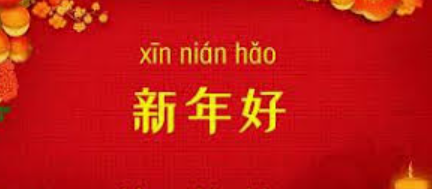
1. Pronunciation In Cantonese
Pinyin Pronunciation: 新年好 (Sān nìhn hóu)
Auido Pronunciation:
2. Pronunciation In Chinese Mandarin
Pinyin Pronunciation: 新年好 (Xīnnián hǎo)
Auido Pronunciation:
3. English Meaning
In general Mandarin, Chinese say Happy New Year – 新年好 (Xīnnián hǎo) to their close friends and family relatives. The literal meaning of this wish is “Good New Year” or “New Year Goodness.” In Mandarin, 好 (hǎo) translates as “good.” Aside from the wish, you can add this word to another or multiple other words to say “Hi.” For instance, 你好 (nǐ hǎo) translates as “hi,” but its literal meaning is “you good”.
You can pronounce it like xīn nián hǎo /sshin-nyen haoww/. The same wish in Cantonese English would be pronounced as san nin hou. This wish for a “Good New Year” also conveys hopes for a prosperous year ahead.
2. “New Year Happiness” – 新年快乐 (Xīnnián kuàilè)
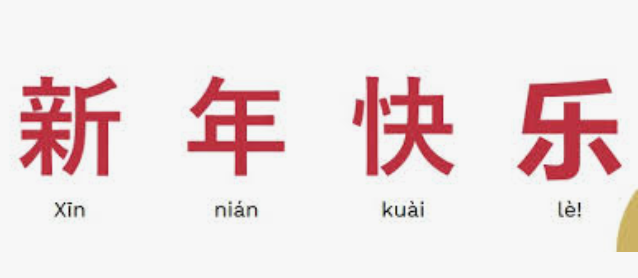
1. Pronunciation In Cantonese
Pinyin Pronunciation: 新年快乐 (Sān nìhn faaih lohk)
Auido Pronunciation:
2. Pronunciation In Chinese Mandarin
Pinyin Pronunciation: 新年快乐 (Xīnnián kuàilè)
Auido Pronunciation:
3. English Meaning
On the other hand, the more formal greetings for the strangers remain 新年快乐 (Xīnnián kuàilè), literally meaning “New Year Happiness.” 新年 (xīnnián) translates as “New Year” and 快乐 (kuàilè) as “happy.”
Chinese also translate 快乐 (kuàilè) as “cheerful” and “joyful.” However, don’t use this word to express your happiness; you will have to use the term 高兴 (gāoxìng, “happy, glad”) for the purpose.
You can practice pronouncing this wish in the way: xīn nián kuài lè /sshin-nyen kwhy-ler/. However, in Cantonese, it is pronounced sun nin fai lok.
3. “Happy Spring Festival” – 春节快乐 (Chūnjié kuàilè)
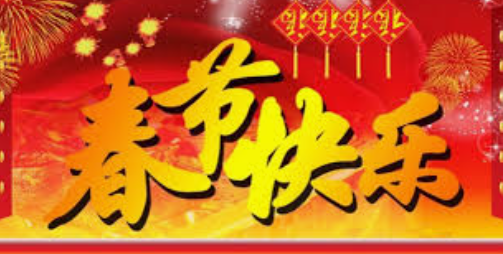
1. Pronunciation In Cantonese
Pinyin Pronunciation: 春节快乐 (Chēun gíp faaih lohk)
Auido Pronunciation:
2. Pronunciation In Chinese Mandarin
Pinyin Pronunciation: 春节快乐 (Chūnjié kuàilè)
Auido Pronunciation:
3. English Meaning
Undoubtedly, the Western New Year has nothing to do with the Spring, but the Chinese closely relate their New Year festivities with the start of the Spring. It’s when they celebrate the previous year’s ending and welcome the next one with the Spring. However, you can say Happy New Year in Chinese as 春节快乐 (chūnjié kuàilè).
The term 春节 (chūnjié) packs up the meaning “Spring Festival,” and the 快乐 (kuàilè) translates as “happy.” We have already mentioned the other meanings of the latter word in the section above.
The pronunciation of this phrase is /chwn-jyeh kwai-luh/ in Mandarin, and in Cantonese, it’s pronounced as chun jit faa lok.
4. Happy New Year – 恭贺新禧 (gōnghè xīnxǐ)
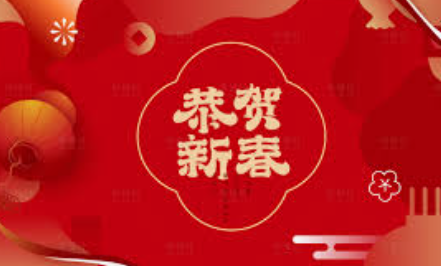
1. Pronunciation In Cantonese
Pinyin Pronunciation: 恭贺新禧 (Gūng hoh sān héi)
Auido Pronunciation:
2. Pronunciation In Chinese Mandarin
Pinyin Pronunciation: 恭贺新禧 (gōnghè xīnxǐ)
Auido Pronunciation:
3. English Meaning
Here, we have another formal greeting that isn’t commonly used in Chinese conversations, i.e., Happy New Year – 恭贺新禧 (gōnghè xīnxǐ). Coming to the literal meanings, 恭贺 (gōnghè) translates as “to congratulate,” 新 (xīn) as “new,” and 禧 (xǐ) as “fortune, jubilation, and hapiness.”
When wishing in Chinese, you won’t have to go beyond the literal meanings of each word, as when used over the years, these words have lost their literal sense and are now more commonly used in their general meaning.
You may pronounce 恭贺新禧 (gōnghè xīnxǐ) in Mandarin Chinese as follows: gong-her shin-shee. However, in Cantonese, it is pronounced gung-ho san-hei.
5. “Wishing you Happiness and Prosperity” – 恭喜发财 (Gōng xǐ fā cái)
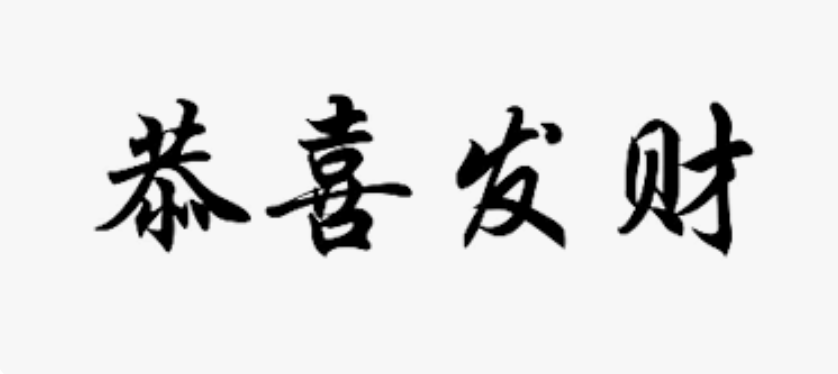
1. Pronunciation In Cantonese
Pinyin Pronunciation: 恭喜发财 (Gūng héi faat chòih)
Auido Pronunciation:
2. Pronunciation In Chinese Mandarin
Pinyin Pronunciation: 恭喜发财 (Gōng xǐ fā cái)
Auido Pronunciation:
3. English Meaning
Lastly, in Chinese Cantonese, they say 恭喜发财 (Gong hei fat choy). It means “Wishing you happiness and prosperity.” 恭喜 (Gung hei) means happy, and 发财 (Fat Choi) means prosperity or to become rich. In this context, the latter term is associated with wishing for prosperity for the upcoming year.
You can well-pronounce it in this way in Mandarin: gōng xǐ fā cái /gong-sshee faa-tseye/ and in Cantonese, it will be as, gong hay fat choy. This phrase is often used during family gatherings, which are a central part of Chinese New Year celebrations for Chinese families.
Book a free trial class now and learn how to say Happy New Year in Chinese Mandarin or Cantonese with Wukong’s professional Chinese teacher!
Part 2: 10 Best Ways to Wish Someone Happy Chinese New Year 2025 (With Audio Pronunciation)

Elevate your Chinese New Year greetings in 2025 with our Part 2 guide featuring the 10 best ways to wish someone a Happy Chinese New Year. From the classic “新年快乐” (Xīnnián kuàilè) to more unique expressions, our guide provides audio pronunciation to perfect your delivery. Capture the essence of the dragon as you delve into the cultural significance of Chinese New Year. Immerse yourself in the festive spirit and spread joy to your loved ones with these 10 heartfelt wishes.
These phrases capture the essence of Chinese New Year’s celebrations, which are rich in cultural significance and tradition. Unlock the secrets of expressing “Happy New Year” in Chinese and Cantonese with our comprehensive guide. Learn the Pinyin transliteration, audio pronunciation, and meanings of popular phrases such as “新年快乐” (Xīnnián kuàilè) and “恭喜发财” (Gōngxǐ fācái). Immerse yourself in the richness of the Chinese language as you explore the cultural nuances of New Year greetings. Start the year on a positive note, embracing Chinese traditions and ushering in a prosperous and auspicious 2025.
1. 蛇年行大运
Pronunciation In Cantonese: 蛇年行大运 (Lùhng nìhn hàhng daaih wahn)
Pinyin: Lóng nián xíng dà yùn
Auido Pronunciation:
English Meaning: May the Year of the Dragon bring you great fortune and success.
2. 蛇年福星高照
Pronunciation In Cantonese: 蛇年福星高照 (Lùhng nìhn hàhng daaih wahn)
Pinyin: Lóng nián fú xīng gāo zhào
Auido Pronunciation:
English Meaning: May the lucky star shine upon you in the Year of the Dragon.
3. 蛇年财源滚滚
Pronunciation In Cantonese: 蛇年财源滚滚 (Lùhng nìhn chòih yùhn gún gún)
Pinyin: Lóng nián cái yuán gǔn gǔn
Auido Pronunciation:
English Meaning: May wealth flow abundantly to you in the Year of the Dragon.
4. 蛇年事业腾飞
Pronunciation In Cantonese: 蛇年事业腾飞 (Lùhng nìhn sìh yih tàhng fēi)
Pinyin: Lóng nián shì yè téng fēi
Auido Pronunciation:
English Meaning: May your career soar to new heights in the Year of the Dragon.
5. 蛇年身体健康
Pronunciation In Cantonese: 蛇年身体健康 (Lùhng nìhn sān tái gín hōng)
Pinyin: Lóng nián shēn tǐ jiàn kāng
Auido Pronunciation: 龙年身体健康 (Lùhng nìhn sān tái gín hōng)
English Meaning: May you enjoy good health throughout the Year of the Dragon.
6. 蛇年家庭和睦
Pronunciation In Cantonese: 蛇年家庭和睦 (Lùhng nìhn gāai tàahng wòh mūt)
Pinyin: Lóng nián jiā tíng hé mù
Auido Pronunciation:
English Meaning: May your family be harmonious and peaceful in the Year of the Dragon. The reunion dinner, or year’s eve dinner, is a significant tradition where Chinese families gather to celebrate and enjoy special dishes symbolizing abundance and good fortune.
7. 蛇年爱情甜蜜
Pronunciation In Cantonese: 蛇年爱情甜蜜 (Lùhng nìhn ngoi chìhng tìhm māt)
Pinyin: Lóng nián ài qíng tián mì
Auido Pronunciation:
English Meaning: May love be sweet and fulfilling for you in the Year of the Dragon.
8. 蛇年学业有成
Pronunciation In Cantonese: 蛇年学业有成 (Lùhng nìhn hohk yih yáuh sìhng)
Pinyin: Lóng nián xué yè yǒu chéng
Auido Pronunciation:
English Meaning: May your academic pursuits be successful in the Year of the Dragon.
9. 龙年朋友如龙
Pronunciation In Cantonese: 蛇年朋友如龙 (Lùhng nìhn pàhng yáuh yùh lùhng)
Pinyin: Lóng nián péng yǒu rú lóng
Auido Pronunciation:
English Meaning: May you have friends as loyal and mighty as dragons in the Year of the Dragon.
10. 蛇年幸福满溢
Pronunciation In Cantonese: 蛇年幸福满溢 (Lùhng nìhn hohng fūk mùhn yāp)
Pinyin: Lóng nián xìng fú mǎn yì
Auido Pronunciation:
Part 3: 10 Idioms with Snake Characters to Wish Someone Happy New Year
Here are 10 Chinese idioms that include the character for “snake” (蛇, shé) along with their meanings. These can be used to convey good wishes for the New Year:
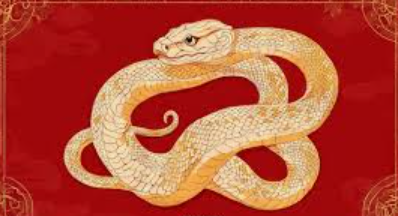
- 蛇年大吉 (shé nián dà jí)
Translation: Good luck in the Year of the Snake. - 蛇行天下 (shé xíng tiān xià)
Translation: The snake travels the world; symbolizing traveling far and achieving success. - 蛇头蛇尾 (shé tóu shé wěi)
Translation: A snake’s head and tail; representing consistency from beginning to end. - 龙蛇混杂 (lóng shé hùn zá)
Translation: A mix of dragons and snakes; indicating a mix of good and bad. - 蛇有蛇道 (shé yǒu shé dào)
Translation: A snake has its own path; implying everyone has their own way of life. - 蛇蝎心肠 (shé xiē xīn cháng)
Translation: A heart like a snake’s or scorpion’s; referring to a cruel person. - 画蛇添足 (huà shé tiān zú)
Translation: To draw a snake and add feet; meaning to ruin something by overdoing it. - 蛇出洞来 (shé chū dòng lái)
Translation: The snake comes out of its hole; symbolizing someone revealing themselves or their intentions. - 一蛇二蛇 (yī shé èr shé)
Translation: One snake, two snakes; often used to describe something that is simple or easy. - 蛇飞龙舞 (shé fēi lóng wǔ)
Translation: Snakes flying and dragons dancing; representing a lively and prosperous atmosphere.
These idioms can add a playful and culturally rich touch to your New Year greetings! If you need audio pronunciation, consider using language learning platforms or apps, as I can’t provide audio directly.
Part 4: 10 Idioms with Dragon Characters to Wish Someone Happy New Year (With Audio Pronunciation)
In Chinese culture, the dragon is a symbol of good fortune, power, and prosperity. Using idioms with dragon characters to wish someone a happy new year adds a touch of cultural richness and auspiciousness to your greetings. Here are 10 idioms with dragon characters that you can use to wish someone a happy new year:
![25 Top Ways to Say Happy New Year in Chinese and Cantonese [Auido Pronunciation] - WuKong Blog](https://wp-more.wukongedu.net/blog/wp-content/uploads/2023/12/image-283.png)
Welcome the New Year in style by mastering 10 best Chinese idioms with dragon characters that convey “Happy New Year” wishes in a truly unique way. From “龙马精神” (lóng mǎ jīngshén) to “龙争虎斗” (lóng zhēng hǔ dòu), these idioms are not only rich in meaning but also reflect the cultural significance of dragons in Chinese traditions. Enhance your greetings with the power and auspiciousness associated with dragons. With Pinyin and audio pronunciation, you can confidently pronounce these idioms in Mandarin or Cantonese. Say “Happy New Year” in Chinese using dragon-themed idioms and bring good fortune and prosperity to the year ahead. Start the year on a cultural high note in 2025.
1. 龙翔凤舞
Pronunciation In Cantonese: 龙翔凤舞 (Lùhng hèung fuhng mōu)
Pinyin: Lóng xiáng fèng wǔ
Auido Pronunciation:
English Meaning: Dragons soaring and phoenixes dancing – wishing for a year of great joy and prosperity.
2. 龙马精神
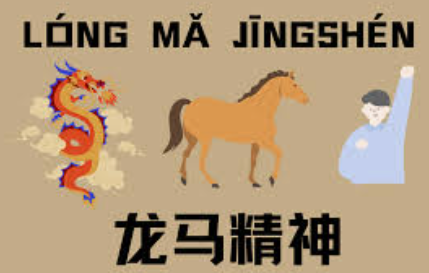
Pronunciation In Cantonese: 龙马精神 (Lùhng mā gīng sān)
Pinyin: Lóng mǎ jīngshén
Auido Pronunciation:
English Meaning: Possessing the spirit and vitality of a dragon and horse – wishing for a year filled with energy and enthusiasm.
3. 龙行天下
Pronunciation In Cantonese: 龙行天下 (Lùhng hàhng tīn hah)
Pinyin: Lóng xíng tiān xià
Auido Pronunciation:
English Meaning: Dragons ruling the world – symbolizing power and success in all endeavors.
4. 龙争虎斗
Pronunciation In Cantonese: 龙争虎斗 (Lùhng jāng fū dáu)
Pinyin: Lóng zhēng hǔ dòu
Auido Pronunciation:
English Meaning: Dragons and tigers fighting fiercely – representing intense competition and the pursuit of excellence.
5. 龙腾虎跃
Pronunciation In Cantonese: 龙腾虎跃 (Lùhng tàhng fū yeuhp)
Pinyin: Lóng téng hǔ yuè
Auido Pronunciation:
English Meaning: Dragons soaring and tigers leaping – wishing for a year of great achievements and breakthroughs.
6. 龙吟虎啸
Pronunciation In Cantonese: 龙吟虎啸 (Lùhng yàhm fū siu)
Pinyin: Lóng yín hǔ xiào
Auido Pronunciation:
English Meaning: Dragons roaring and tigers growling – symbolizing strength, courage, and the determination to overcome challenges.
7. 龙飞凤舞
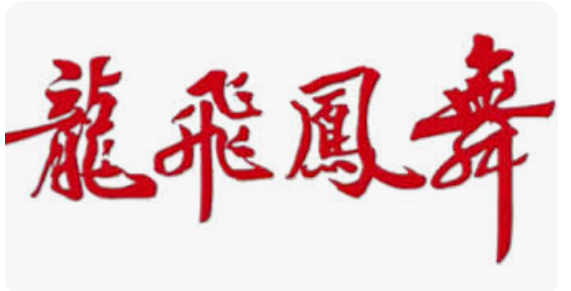
Pronunciation In Cantonese: 龙飞凤舞 (Lùhng fēi fuhng mōu)
Pinyin: Lóng fēi fèng wǔ
Auido Pronunciation:
English Meaning: Dragons flying and phoenixes dancing – expressing a vibrant and auspicious atmosphere.
8. 龙兴虎威
Pronunciation In Cantonese: 龙兴虎威 (Lùhng hīng fū wāi)
Pinyin: Lóng xīng hǔ wēi
Auido Pronunciation:
English Meaning: Dragons rising and tigers demonstrating their might – symbolizing power, authority, and influence.
9. 龙战于野
Pronunciation In Cantonese: 龙战于野 (Lùhng jīn yū yé)
Pinyin: Lóng zhàn yú yě
Auido Pronunciation:
English Meaning: Dragons battling in the wilderness – representing the pursuit of success and victory in the face of adversity.
10. 龙凤呈祥
Pronunciation In Cantonese: 龙凤呈祥 (Lùhng fuhng chìhng chèuhng)
Pinyin: Lóng fèng chéng xiáng
Auido Pronunciation:
English Meaning: Dragons and phoenixes symbolizing harmony and auspiciousness – wishing for a year filled with blessings and good fortune.
Part 5: How to Write ‘Happy Chinese New Year’ in Chinese?
![25 Top Ways to Say Happy New Year in Chinese and Cantonese [Auido Pronunciation] - WuKong Blog](https://wp-more.wukongedu.net/blog/wp-content/uploads/2025/02/image-76.png)
Looking for how to write “Happy Chinese New Year” in Chinese? Discover the phrase and its meaning in our concise guide. Learn how to write “新年快乐” (Xīnnián kuàilè) in Chinese characters and impress your friends and loved ones during the festive season. Start the Chinese New Year off right with this essential phrase.
新年快乐 (Xīnnián kuàilè)
In Chinese characters, it is written as:
新 (Xīn) – meaning “new”
年 (nián) – meaning “year”
快乐 (kuàilè) – meaning “happy” or “joyful”
So, when combined, “新年快乐” (Xīnnián kuàilè) translates to “Happy New Year” in Chinese.
Responding to Happy Chinese New Year
When someone greets you with “Happy Chinese New Year” or “新年快乐” (xīn nián kuài lè), it’s polite to respond with a phrase that shows your appreciation and returns the greeting. Here are a few options:
Bonus Phrases
Here are a few more bonus phrases you can use during Chinese New Year celebrations to add variety to your greetings:
FAQs About Happy New Year in Chinese
Q1: How do you wish the Chinese Happy New Year?
There are multiple ways to say Happy New Year in Chinese. You may refer to the guide above. However, if we had to choose one wish as the most common one, it would be “Good New Year” – 新年好 (Xīnnián hǎo) or “New Year Happiness” – 新年快乐 (Xīnnián kuàilè).
Q2: How do you Wish for the Dragon Year in Chinese?
To wish for the Dragon Year in Chinese, you can rely on the phrase 龙年大吉 (Lóng nián dàjí), meaning “Great luck in the Dragon Year,” or say 龙马精神 (Lóng mǎ jīngshén), meaning “Wishing you the spirit and vitality of the dragon and horse.” Another wish is 祥龙贺岁 (Xiang Long He Sui); “Good Luck Dragon Wishes You a Happy New Year.”
Q3: How to write Happy New Year in Chinese character?
“Happy New Year” in Chinese characters is written as 新年快乐 (xīn nián kuài lè).

Conclusion: Ready for Chinese New Year?
With these phrases and idioms, you’re now ready to celebrate Chinese New Year like a pro! Remember to use the correct pronunciation and tones to show respect and appreciation for the culture. Don’t forget to wear red clothes and give red envelopes filled with lucky money to mostly children and seniors. Gong hei fat choy!
By incorporating these greetings into your Chinese New Year festivities, you’ll be able to share in the joy and cultural richness of the holiday. Wishing you a prosperous and auspicious new year! How to Say Good Luck in Chinese you can also use in the new year, check for more Chinese phrases.
Summary
In this comprehensive guide, we have introduced 25 ways to express New Year greetings in Chinese, complete with their pinyin pronunciations and audio recordings. Chinese wishes are not limited to a few choices; you have a plethora of options to say “Happy New Year” in Chinese. However, the most common greeting remains “新年好” (Xīn nián hǎo).
In this guide, we have provided a selection of greetings for you to practice pronouncing or writing to wish your loved ones a Happy Chinese New Year. We hope you found this guide valuable and informative. Stay tuned for more interesting guides in the WuKong Chinese Online Classes.
Learn authentic Chinese from those who live and breathe the culture.
Specially tailored for kids aged 3-18 around the world!
Get started free!
Bella holds a Master’s degree from Yangzhou University and brings 10 years of extensive experience in K-12 Chinese language teaching and research. A published scholar, she has contributed over 10 papers to the field of language and literature. Currently, Bella leads the research and development of WuKong Chinese core courses, where she prioritizes academic rigor alongside student engagement and cognitive development. She is dedicated to building a robust foundation for young learners covering phonetics (Pinyin), characters, idioms, and classical culture while ensuring that advanced courses empower students with comprehensive linguistic mastery and cultural insight.











![Horoscope Chinese and 12 Chinese Zodiac Signs [2025 Guide] Horoscope Chinese and 12 Chinese Zodiac Signs [2025 Guide]](https://wp-more.wukongedu.net/blog/wp-content/uploads/2023/12/image-91-520x293.jpeg)












![Best Guide to Saying Yes in Chinese [2025 Guide] Best Guide to Saying Yes in Chinese [2025 Guide]](https://wp-more.wukongedu.net/blog/wp-content/uploads/2024/01/image-507-520x293.png)
![Lucky Number 8 in Chinese - Comprehensive Guide [2025] Lucky Number 8 in Chinese - Comprehensive Guide [2025]](https://wp-more.wukongedu.net/blog/wp-content/uploads/2024/04/image-313-520x293.png)
![WeChat in Chinese: A Comprehensive Guide [2025] WeChat in Chinese: A Comprehensive Guide [2025]](https://wp-more.wukongedu.net/blog/wp-content/uploads/2023/12/image-139-520x293.png)

Comments0
Comments